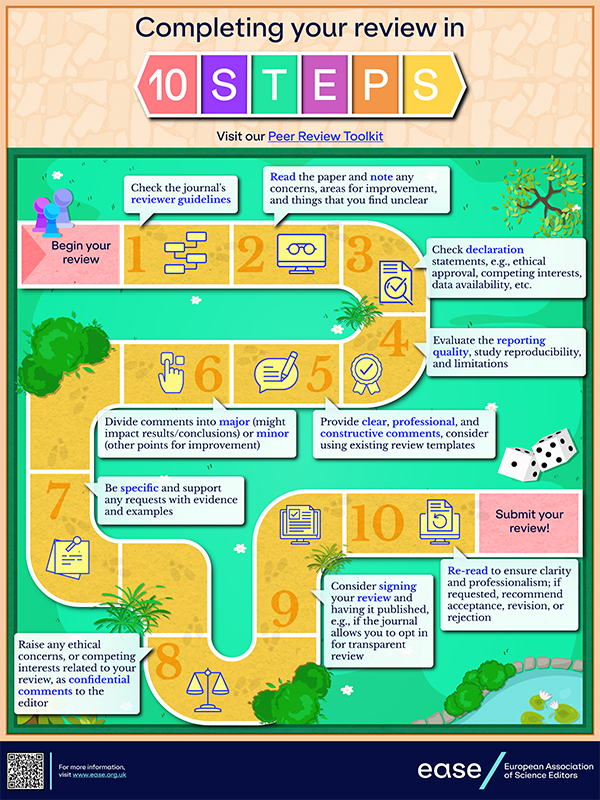How to write a review report
Below you will find our 10-step guide with links and resources on how to write reviews for journals. Some elements may be applicable to other review activities (i.e., preprints, conferences, grants) and you are welcome to adapt them. At the end of the page we also provided links to external guides on the same topic.

- Check the reviewer guidelines
- Read the paper
- Check data and declarations
- Check reporting adherence
- Develop your comments
- Specify major vs minor comments
- Support your statements
- Add any confidential comments
- Respect transparency
- Finalise the report

EASE 10-step guide
1. check the reviewer guidelines.
Check the journal’s reviewer guidelines which will outline what reviewing for this journal entails and the journal’s peer review model (e.g. closed or open review). If you have any questions or uncertainties about the journal’s review approach, communicate with the editor before you start. In particular, make sure to check whether the journal allows you to use generative AI or other automated tools to assist in preparing your review report and/or whether the journal allows you to and co-review it with a colleague.
Several examples of reviewer guidelines can be found here:
- GIE Journal’ ‘How to review’ A light read, from the American Society for Gastrointestinal Endoscopy, covering the basic dos and don’ts of peer review with 13 rules offering some sound advice.
- PLOS One – Guidelines for Reviewers This comprehensive guide provides best practices for reviewers, including specifics of reviewing registered reports, lab and study protocols.
2. Read the paper
Read the paper in full and make comments; it sometimes helps to read the paper first and comment on a second read. Focus on important study aspects the journal requests your input on, or consider the following:
- Any serious flaws to the hypothesis, methods, results or conclusions?
- Are the sample size and the statistical methods applied appropriate?
- Does the data support the conclusions?
- Does the reporting allow you to fully understand the research?
- Are there any concerns related to research integrity?
3. Check data and declarations
Check information about the authors and the study provided with the paper e.g. competing interests, author contributions, ethical approval. Is sufficient data provided or accessible to enable a full review of the study? If applicable, is a protocol for the study available?
4. Check reporting adherence
Check the reporting: where relevant, does the information provided allow the work to be reproduced and replicated? Do the aims and analyses match the pre-specified study protocol (if applicable)? Are any limitations discussed?
Reporting guidelines for specific study types can help assess if the paper reports the necessary information, you can find a wide range of reporting guidelines for different study types at the EQUATOR network . A couple of widely adopted reporting guidelines are CONSORT for clinical trials and PRISMA for systematic reviews and meta-analyses.
5. Develop your comments
You can develop free-text comments, or use a structured format following manuscript sections – Introduction, Methods, Results, Discussion. Some journals will ask you to follow specific templates.
Ensure the comments are clear, concise and constructive, and remember to be kind to the authors when providing your feedback.

6. Specify major vs minor comments
Specify whether issues raised are:
Major: items fundamental to the study that must be addressed and might need re-review
Minor: improvements or clarifications that do not affect the overall conclusions.
7. Support your statements
Be specific so that the requests are clear for the authors; justify any recommendations or critiques with evidence and examples.
8. Add any confidential comments
Many journals will have a section in their review form for confidential comments to the editor, that is, comments to raise with the editor but which will not be included in the review shared with the author. Consider whether you have any comments you’d like to share only with the editor, items in this section may include ethical concerns about the study or competing interests to declare as a reviewer.
9. Respect transparency
Some journals publish the reviews with accepted articles. If the journal does not publish reviews but you’d like to share your review publicly, you can request their permission to post it as a comment on the article (or the preprint, if applicable) or via a third-party platform such as Publons, Zenodo or ScienceOpen.
If the review provides an option to sign your review, consider whether you would like to sign your report; note that some journals operate peer review models that require reviewers to sign their reviews (e.g. the BMJ).
10. Finalise the report
Re-read the report to check for clarity, and to ensure the tone is professional and respectful. If requested by the journal, provide your recommendation on publication (e.g. accept, revision, reject). Once ready, submit your review.
Additional guides on how to write review reports can be found here:
Detailed journal guides:
- Participating in the Peer Review Process
Publisher guides:
- How to conduct a review by Elsevier
- How to write a peer review by Clarivate
- Dr Esther Freeman: How to become a peer reviewer
Examples of (structured peer review) templates can be found here:
- Peer review report template by Authorea
- Excellence in Peer Review checklist by Taylor and Francis
- Peer Review templates by CardioVascular and Interventional Radiology journal

IMAGES